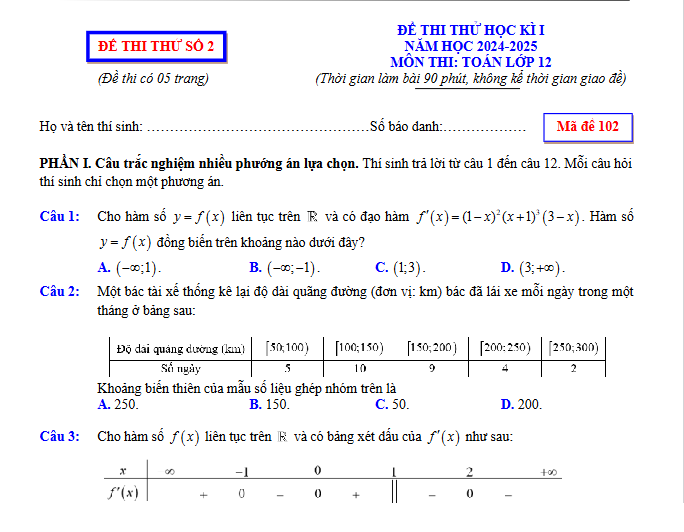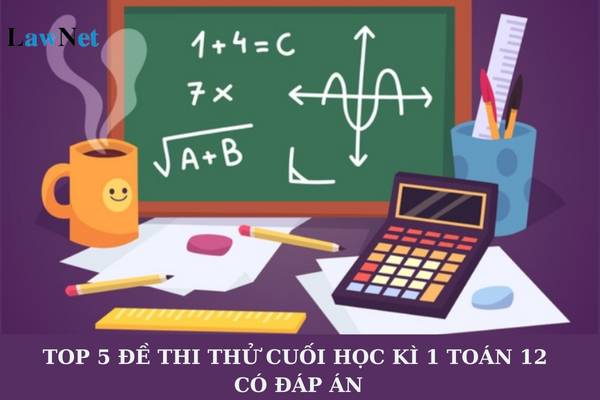What are the Top 5 mock 1st end-of-semester question papers and answers for 12th-grade Mathematics? What are the perspectives for developing the 12th-grade Mathematics curriculum in Vietnam?
What are the Top 5 mock 1st end-of-semester question papers and answers for 12th-grade Mathematics in Vietnam?
The structure of the mock 1st end-of-semester question papers for 12th-grade Mathematics in Vietnam is as follows:

Download mock 1st end-of-semester question papers and answers for 12th-grade Mathematics in Vietnam.
Note: The information is for reference only.

What are the Top 5 mock 1st end-of-semester question papers and answers for 12th-grade Mathematics? What are the perspectives for developing the 12th-grade Mathematics curriculum in Vietnam? (Image from Internet)
What are the perspectives for developing the 12th-grade Mathematics curriculum in Vietnam?
Under Section II of the General education program in Mathematics issued with Circular 32/2018/TT-BGDDT, the perspectives for developing the 12th-grade Mathematics curriculum in Vietnam are defined as follows:
The Mathematics curriculum thoroughly implements the basic regulations outlined in the overall curriculum; inherits and promotes the strengths of the current curriculum and previous curricula, selectively absorbs experiences in designing subject curricula from advanced countries around the world, accesses achievements in educational science, and considers Vietnam's economic and social conditions. Additionally, the Mathematics curriculum emphasizes several viewpoints as follows:
[1] Ensuring simplification, practicality, modernity
The Mathematics curriculum ensures simplification, practicality, and modernity by reflecting essential contents that must be addressed in schools, satisfying the need for understanding the world, as well as the interests and preferences of learners, aligned with contemporary global approaches. The curriculum adheres to the spirit of "mathematics for everyone", where everyone can learn mathematics but each person can learn it in a manner suitable to their interests and abilities.
The Mathematics curriculum emphasizes applicability, connections to real-life or other educational disciplines and activities, especially those aimed at implementing STEM education, aligned with the modern developmental trends of the economy, science, social life, and urgent global issues (such as climate change, sustainable development, financial education, etc.). This is further reflected through practical and experiential activities in mathematics education by means such as conducting projects and study assignments related to mathematics, especially those concerning the application of mathematics in practice; organizing mathematics learning games, mathematics clubs, forums, seminars, mathematics competitions, etc., creating opportunities that help students apply their knowledge, skills, and experiences creatively in real-world contexts.
[2] Ensuring consistency, coherence, and continuous development
The Mathematics curriculum ensures consistency and continuous development (from Grade 1 to 12th-grade), comprising two closely linked branches: one describing the development of core knowledge strands and another describing the development of students' competencies and qualities. Furthermore, the curriculum pays attention to continuity with the preschool education program and provides a foundation for vocational and higher education.
[3] Ensuring integration and differentiation
The Mathematics curriculum implements intra-disciplinary integration revolving around three knowledge strands: Numbers, Algebra, and some elements of Analysis; Geometry and Measurement; Statistics and Probability; practices cross-disciplinary integration through related content, themes, or mathematical knowledge exploited and used in other subjects such as Physics, Chemistry, Biology, Geography, Informatics, Technology, History, Art,...; implements both intra-disciplinary and cross-disciplinary integration through practical and experiential activities in mathematics education.
Simultaneously, the Mathematics curriculum ensures differentiation. For all educational levels, the Mathematics discipline embraces the spirit of learner-centered teaching based on ensuring that the majority of students (across all regions of the country) meet the program's criteria; concurrently, it attends to specialized groups (talented students, students with disabilities, students with difficult circumstances, etc.). For the secondary education level, Mathematics has a system of specialized study topics and learning contents that aim to enhance students' knowledge and practical skills, applying problem-solving in real-world contexts.
[4] Ensuring openness
The Mathematics curriculum ensures unified direction and core, mandatory mathematics educational content for all students nationwide, while granting autonomy and responsibility to localities and schools in selecting and supplementing some mathematics educational content, and implementing educational plans that are suitable for the localities and schools' conditions.
The Mathematics curriculum only prescribes principles and general directions regarding the required achievements in students' qualities and competencies, educational content, educational methods, and assessment of educational outcomes, without overly detailed regulations, allowing textbook authors and teachers to exercise initiative and creativity in implementing the program.
The curriculum ensures stability and developmental capacity during implementation in accordance with scientific-technological advancements and practical demands.
What are the basic requirements regarding teaching methods for 12th-grade Mathematics in Vietnam?
Under Section VI of the General education program in Mathematics issued with Circular 32/2018/TT-BGDDT, the teaching methods for 12th-grade Mathematics in Vietnam should meet the following basic requirements:
- Suit the cognitive progression of students (moving from concrete to abstract, from easy to difficult); not only focusing on the logical nature of mathematical science but also paying attention to approaches based on students' experiences and engagements;
- Embrace the spirit of “learner-centered” education, promoting students' activeness, autonomy, and considering the needs, cognitive capabilities, and different learning styles of each individual student; organizing the teaching process in a constructive manner where students participate in exploration, discovery, reasoning and problem-solving;
- Be flexible in applying active teaching methods and techniques; harmoniously and creatively combine the use of traditional teaching methods and techniques; integrate classroom teaching activities with practical and experiential activities that apply mathematical knowledge to real-life situations. The lesson structure ensures a balanced proportion between core knowledge, applied knowledge, and other components.
- Utilize effectively the necessary teaching tools and equipment in accordance with the Mathematics subject's regulations; be able to use self-made teaching aids suitable for the learning content and students; enhance the use of information technology and modern teaching tools and equipment appropriately and effectively;

